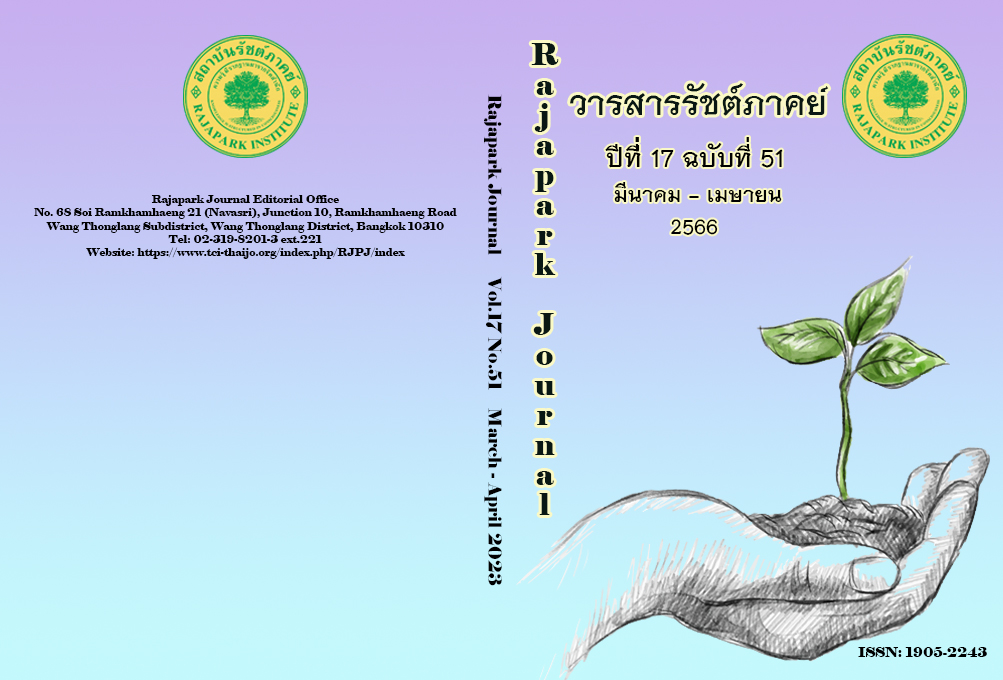A Study of Types of Social Media and Technology Acceptance of Entrepreneurs Who use Social Media as a Channel to Sell Products During the Outbreak of The Coronavirus 2019 (COVID-19)
Main Article Content
Abstract
The objectives of this research were 1) to study the types of social media that entrepreneurs prefer to use as channels for selling products during the outbreak of the Coronavirus 2019 (COVID-19) and 2) to study the level of technology acceptance factors of entrepreneurs who use social media as a channel to sell products during the outbreak of the Coronavirus 2019 (COVID-19). By using survey research with quantitative and qualitative research using questionnaires to collect data. The respondents were 250 entrepreneurs who sell products via social media. The statistics used in the data analysis were descriptive statistics to explain the general characteristics of the samples, namely percentage, mean, and standard deviation. t-test, F-test, and one-way analysis of variance (ANOVA) 1) The social media that entrepreneurs use to sell products during the outbreak of the Coronavirus 2019 (COVID-19) is Facebook. 2) Entrepreneurs who sell products via social media. There are opinions on technology adoption factors. Overall, there was the highest level of agreement. When considering each aspect, it was found that the aspect with the highest level of opinions was the perceived usefulness of use, followed by the attitude toward using, and the side with the least opinions was the ease of use.
Article Details

This work is licensed under a Creative Commons Attribution-NonCommercial-NoDerivatives 4.0 International License.
Views and opinions appearing in the Journal it is the responsibility of the author of the article, and does not constitute the view and responsibility of the editorial team.
References
Aodaom, P. (2016). Attitude toward purchase, impulse buying, and fashion lifestyle affecting the customers’ decisions to buy accessories via online channels in Bangkok[Independent research, Bangkok University].
Davis, F. D., Bagozzi, R. P., & Warshaw, P. R. (1989). User acceptance of computer technology: A comparison of two theoretical models. Management Science, 35(8), 982–1003.
Hair, J.F., Black, W.C., Babin, BJ., & Anderson, R.E. (2010). Multivariate data analysis (7th ed.). Prentice Hall.
Jaikhun, M. (2018). Technology Acceptance, Trust and Social Media Marketing that Effect Consumers from Generations X, Y and Z’s Intention to Buy Products VIA Facebook Live Channels[Master’s Thesis, Rajamangala University of Technology Krungthep].
Ketmongkolpong, P., Boonyapo, K., Siriphuriprarangkorn, K., Sa-Udom, P. (2020). Factors Affecting to Decision-Making of Digital Technology Acceptance for Employees in Private Companies During Coronavirus Disease 2019 Situation, Bangkok. Journal of Local Administration and Innovation, 4(3), 141–156 https://so03.tci-thaijo.org/index.php/JLGISRRU/article/view/247962/168037
Malabuppha, T. (2020). Priceza reveals the number of Thai e-commerce market in 2020 may reach 220 billion baht due to the COVID-19 situation. Techsauce. https://techsauce.co/news/priceza-thailand-e-commerce-market-2020
Piya, C. (2014). A study of social media for construction management case study: Construction of Techno-builder (2001) limited partnership Amphur Maung Nakhon Ratchasima[Master’s Thesis, Suranaree University of Technology].
Prathum, S., & U-senyang, S. (2020). Information Technology Acceptance in the New Normal. Journal of lawasri, 6(1), 1-18. https://so04.tci-thaijo.org/index.php/lawasrijo/article/view/257078/175674
Prawanja, W., & Niruttikul, N. (2021). Perceived Usefulness, Perceived Ease of Use and Intention to Use Mobile Banking Applications among Enterprise of Sole Proprietorship. Journal of Graduate School of Commerce Burapha Review, 16(1), 16-28. http://ojslib3.buu.in.th/index.php/parituch/article/view/7605
Phosri, S. (2020, June 10). The e-commerce market in 2020 may be worth as high as 220,000 million baht, growing by 35%. https://www.bltbangkok.com/news/23943/
Ratsinthorn, D. (2019). Technology Perception Affecting Service Intention Consumer’s Usage via QR Code in Bangkok Metropolitan Area[Master’s Thesis, Srinakharinwirot University].
Roger, E., & Shoemaker, F. (1971). Communication of innovation. The Free Press.
Rovinelli, R.J., & Hambleton, R.K. (1977). On the Use of Content Specialists in the Assessment of Criterion-referenced Test Item Validity. Tijdschrift Voor Onderwijs Research, 2, 49-60.
Schierz, P.G., Schilke, O., & Wirtz, B.W. (2010). Understanding consumer acceptance of mobile payment services: An empirical analysis. Electronic commerce research and applications, 9(3), 209-216.
Sukbot, R. (2020, May 19). Covid-19 with "New Normal" Behavior, New Lifestyle Standards Today and Forever. https://www.wearecp.com/new-normal-190563/
Thipapakul, P., & Waiyachot, P. (2018). A Study of Existy Strategy on Facebook Live[Master’s Thesis, University of the Thai Chamber of Commerce].
Ying, Y. (2020). Factors Affecting the Purchase Decision on Fashion Clothes via Social Media (Facebook) of Working Consumers in Bangkok[Master’s Thesis, Bangkok University].


